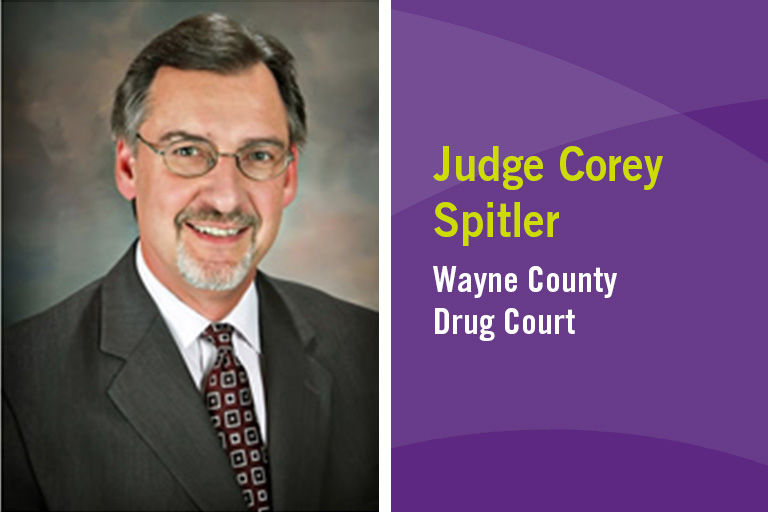Transforming Lives through Wayne County Drug Court: A Conversation with Judge Corey Spitler

Supporting the Recovery Journey
Judge Corey Spitler’s involvement with Wayne County Drug Court dates back to 2010, when he was a magistrate in the Common Pleas Court. He shares that it was Judge Brown who initially started the Drug Court Program in Wayne County but later entrusted Judge Spitler with the responsibility. Having served as a judge since 2011, Judge Spitler has dedicated over a decade to this transformative initiative, witnessing its evolution firsthand.
Judge Spitler acknowledges that Wayne County Drug Court has evolved significantly since its inception. The program continuously adapts and refines its approach to find the most effective methods for assisting participants in their journey to recovery. Notably, one significant development has been the introduction of recovery coaches, providing crucial peer support to individuals grappling with addiction.
A Collaborative Team
Behind the scenes, Wayne County Drug Court operates as a well-coordinated team effort. The team includes counselors, probation officers, recovery coaches, and representatives from various agencies like OneEighty, working together to provide holistic support to participants. Regular team meetings ensure a comprehensive approach to treatment.
Participants progress through Wayne County Drug Court in phases, gradually reducing the intensity of their involvement. Initially, they attend treatment and meetings weekly, eventually shifting to bi-monthly and monthly reporting as they demonstrate progress. The goal is to empower participants to achieve sobriety and self-sufficiency, although the journey often takes more than a year.
A Coach’s Approach and the Importance of Recovery Coaches
Drawing parallels between his role as a judge and that of an athletic coach, Judge Spitler acknowledges the importance of understanding how to motivate each participant individually. Some respond better to positive reinforcement, while others require a firmer approach. Adapting to each person’s unique needs is an ongoing challenge.
Building trust with participants is crucial. The probation department emphasizes that they are there to support, not to punish. Convincing people to seek help and openly communicate their struggles is a gradual process but essential for successful recovery.
Recovery coaches play a pivotal role in Wayne County Drug Court, offering participants a unique form of support. “These recovery coaches are individuals who have battled addiction themselves, and they provide unparalleled peer support to our Drug Court participants,” Judge Spitler observed. Peer support specialists and recovery coaches provide both emotional and practical assistance. They understand the challenges participants face and can offer valuable insights – sometimes even surpassing the understanding of professional counselors. These are people who have pursued,, and continue to navigate, their own recovery.
The Power of Success Stories
While Judge Spitler has witnessed numerous success stories, he explained that it’s often those who have faced setbacks that remain memorable. The program’s success is rooted in its ability to help participants rebuild their lives and embrace recovery. Graduations serve as a testament to this transformation – inspiring new participants to strive for similar achievements.
Judge Spitler emphasizes the incredible resources available in Wayne County, including organizations like OneEighty. These resources play a vital role in assisting individuals on their journey to recovery. The community’s commitment to addressing addiction-related challenges is a significant factor in the success of the Wayne County Drug Court.
Rewarding and Frustrating
Judge Spitler recognizes that prevention is a fundamental challenge. Many participants come from backgrounds marred by dysfunction, addiction, and trauma. Breaking the cycle of addiction requires addressing these issues at their core, which remains a long-term societal challenge.
Judge Spitler aptly summarized his experience with Wayne County Drug Court as both rewarding and frustrating. He explained that witnessing participants’ transformation and newfound hope is immensely gratifying. “It’s great to see these people that can come out of those backgrounds and find out there is a different way of living,” he reflected.
However, he also acknowledges the ongoing struggle to address addiction and its root causes in society. And he points to the power of pain as a great motivator for change. While success stories abound, he recognizes that not all participants are visible after graduation. Some individuals who have faced adversity and pain may silently find their way to recovery without ever entering the courtroom.
Looking Forward
When asked about his vision for the future of Wayne County Drug Court, Judge Spitler expressed, “I can only wish for a world where every child is born into a loving and nurturing environment, free from the cycle of addiction and dysfunction.” In the meantime, he upholds and supports the court’s dedication to breaking this cycle – one participant at a time.
We’re here to support you.
We help people change direction with programs for addiction, domestic violence, rape crisis, mental health, housing, and prevention and education. At OneEighty, we actively support an evidence-based approach to sustainable recovery from trauma and addiction – restoring dignity and purpose, reimagining potential, and rebuilding lives. OneEighty offers counseling programs, intensive addiction treatment programs, group addiction treatment, residential services, victim services, recovery housing, and peer recovery.
OneEighty Resources
For those encountering a substance use crisis please call OneEighty’s Substance Use Crisis hotline available 24 hours per day, 365 days per year at 330-466-0678. For other resources, click the links below:
Community Relations & Prevention
Substance Use Treatment Navigator Hotline
Intimate Partner & Domestic Violence booklet (Wayne County)
Self-Help Legal Manual
Follow us on Facebook, Instagram, and LinkedIn.
OneEighty Resources
For those encountering a substance use crisis, please call OneEighty’s Substance Use Crisis hotline, available 24 hours per day, 365 days per year, at 330-466-0678. For other resources, click the links below:

